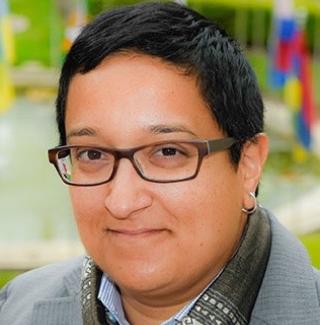Naazneen Barma to Lead Scrivner Institute of Public Policy
Barma to assume post as head of Josef Korbel School's public policy program Sept. 1, 2020
The Josef Korbel School of International Studies at the University of Denver announced today that Naazneen H. Barma, Ph.D. will be joining the Doug and Mary Scrivner Institute for Public Policy as Director and Scrivner Chair and Associate Professor effective Sept. 1, 2020.
Barma will be joining the Scrivner Institute from the Naval Postgraduate School (NPS) where she has been a faculty member in the Department of National Security Affairs since 2010.
Barma’s areas of expertise are an excellent fit for the Scrivner Institute and include economic development and institutional reform, peacebuilding in post-conflict societies, foreign aid, democratization, and the nature of the liberal world order and its ongoing evolution. She is the author of The Peacebuilding Puzzle: Political Order in Post-Conflict States (Cambridge University Press 2017), a path-breaking study that explains why foreign peacebuilding interventions in post-conflict societies often fall short of their intended goals. In addition, she is the co-author of a comprehensive World Bank study entitled Rents to Riches? The Political Economy of Natural Resource-Led Development, co-editor on another major World Bank publication, Institutions Taking Root: Building State Capacity in Challenging Contexts, and co-editor of the Political Economy Reader: Markets as Institutions, which Routledge will publish in its second edition early next year.
“I am thrilled by the appointment of Dr. Barma,” says Frederick “Fritz” Mayer, the Dean of the Josef Korbel School. “She brings a unique blend of policy experience, policy-relevant and impactful research, and deep commitment to practical and ethical training of future leaders. We could not have asked for a better person to lead the Scrivner Institute.”
The Scrivner Institute of Public Policy hosts the only Master of Public Policy program in the Rocky Mountain West as well as an undergraduate major in public policy. It supports interdisciplinary applied research on public policy issues, provides informative public programming, and serves as a convener of experts and practitioners seeking to solve pressing public policy issues. While the Scrivner Institute is based in the Josef Korbel School of International Studies it also draws its faculty from across the wider University of Denver campus, allowing for collaboration across subject areas and the ability to see local issues through a global lens and address global issues through local engagement.
“Mary and I are delighted by the appointment of Dr. Barma to lead the Scrivner Institute of Public Policy,” says Douglas Scrivner, who together with his wife, Mary, made a generous gift to establish the Doug and Mary Scrivner Institute of Public Policy in 2018. “She is an extraordinary interdisciplinary scholar, practitioner and leader. Barma’s dynamic mix of experience and scholarship in the arenas of both public policy and international affairs make her an exceptional fit for this role and she will create an exciting new chapter for the Scrivner Institute.”
Prior to her academic appointment at NPS, Barma served two separate three-year stints at the World Bank, later followed by a three-year consultancy there. Over this past academic year, she has been a Fellow at the Berggruen Institute in their Geopolitics and Globalization program. Barma was also a co-founder and remains a co-director of the influential Bridging the Gap initiative, which is devoted to enhancing the policy impact of contemporary international affairs scholarship and supported by the Carnegie Corporation.
“I’m thrilled to have the opportunity to join the Korbel School faculty as the incoming Scrivner Chair and Director,” says Barma. “I can’t wait to get to work with the Korbel School and broader DU community on building an inclusive, engaged, innovative, and ethical public policy institute that actively grapples with the contemporary policy challenges of our day.”
Barma brings with her wide-ranging scholarship and policy engagement experience. She is also an extraordinary teacher committed to rigorous and inclusive pedagogy and has won three distinct teaching awards at NPS. She holds her Ph.D. and an M.A. from the University of California, Berkeley in political science along with an M.A. in international policy studies and a B.A. in international relations and economics from Stanford University.



